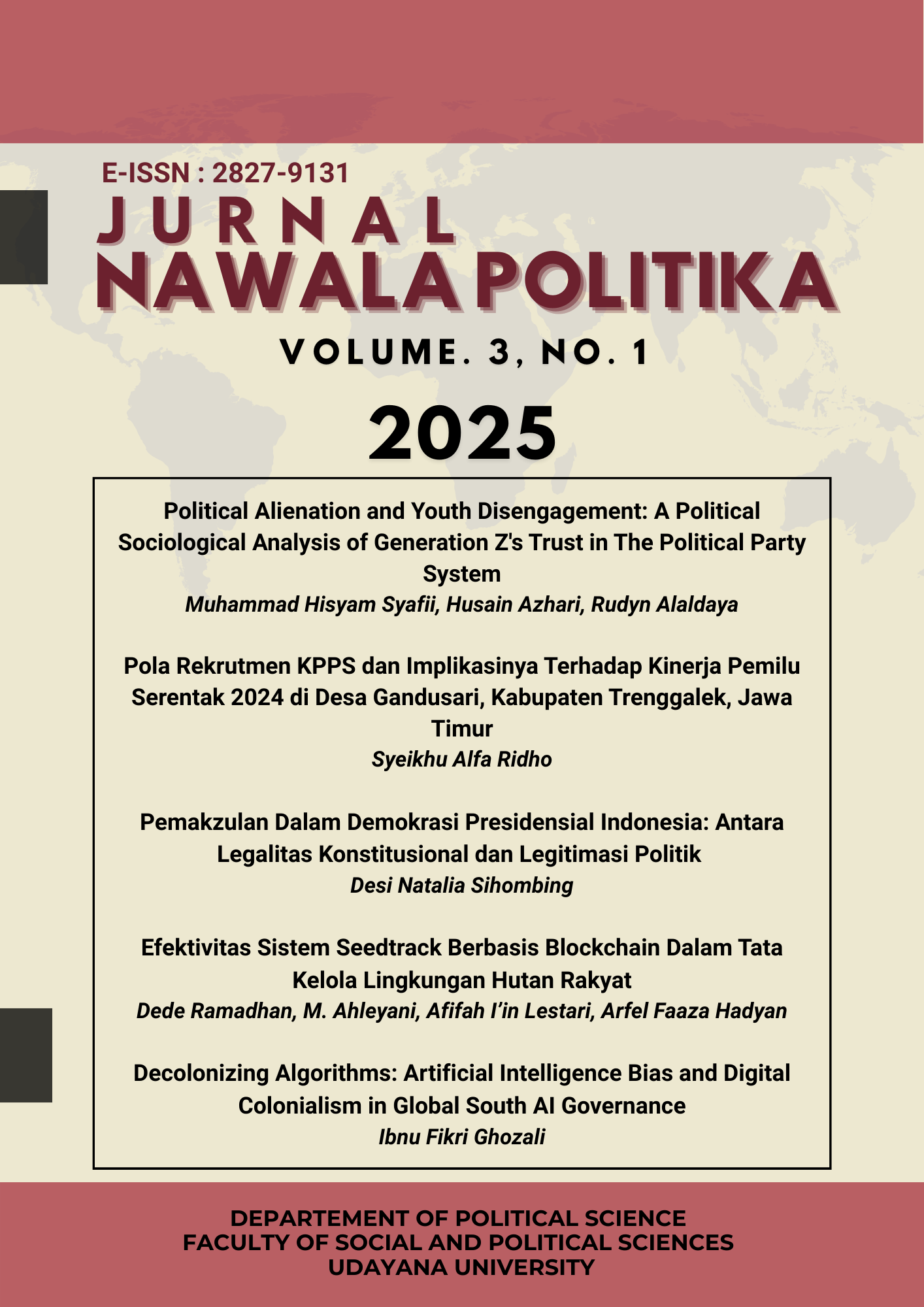Political Alienation and Youth Disengagement: A Political Sociological Analysis of Generation Z's Trust in The Political Party System
DOI:
https://doi.org/10.24843/jnp.v3i1.102Keywords:
political alienation, youth disengagement, political trust, Generation Z, bibliometric analysisAbstract
This study examines the phenomena of political alienation and the increasing disengagement of Generation Z from the formal political system, emphasizing their trust in political parties. This research employs a bibliometric analysis spanning 25 years (2000–2025) to chart the evolution of scholarship on teenage political disaffection, integrating theories of political alienation, political socialization, and political trust. The findings indicate that traditional frameworks insufficiently address the difficulties of political detachment in the digital age, where helplessness, meaninglessness, and isolation appear in contradictory forms. Notwithstanding Generation Z's extensive connectedness and access to political information, their trust in conventional institutions is markedly diminished. The research emphasizes the preeminence of Western scholarship in this domain, while accentuating the pressing necessity for region-specific investigations in emerging democracies like Indonesia. This research presents a refined analytical framework that incorporates structural, generational, and psychological aspects to comprehend juvenile political estrangement.
Downloads
References
Amin, M., & Ritonga, A. D. (2024). Diversity, Local Wisdom, and Unique Characteristics of Millennials as Capital for Innovative Learning Models: Evidence from North Sumatra, Indonesia. Societies, 14(12), 260. https://doi.org/10.3390/soc14120260
Appleton, J. (2019). Self, Society, Alienation: From Marx to Identity Politics. In From Self to Selfie (pp. 129–146). Springer International Publishing. https://doi.org/10.1007/978-3-030-19194-8_8
Benedicto, J., & Ramos, M. (2018). Young People’s Critical Politicization in Spain in the Great Recession: A Generational Reconfiguration? Societies, 8(3), 89. https://doi.org/10.3390/soc8030089
Bennett, W. L., & Segerberg, A. (2012). THE LOGIC OF CONNECTIVE ACTION. Information, Communication & Society, 15(5), 739–768. https://doi.org/10.1080/1369118X.2012.670661
Brown, P. X. Y. L. (2022). Industrial Pollution, Social Trust, and Civic Engagement: A Nationwide Study of the Socioenvironmental Nature of Social Capital. Sociological Perspectives, 65(5), 869–892. https://doi.org/10.1177/07311214211067755
Clarke, S. (1991). Marx, Marginalism and Modern Sociology. In Marx, Marginalism and Modern Sociology (pp. 290–328). Palgrave Macmillan UK. https://doi.org/10.1007/978-1-349-21808-0_9
Cook, K. S., & Cook, B. D. (2021). Social and political trust. In Routledge International Handbook of Contemporary Social and Political Theory (pp. 280–293). Routledge. https://doi.org/10.4324/9781003111399-23
Cutler, Neale. (1976). Generational Approaches to Political Socialization. Youth & Society, 8(2), 175–207. https://doi.org/10.1177/0044118X7600800201
Dalton, R. J., Scarrow, S. E., & Cain, B. E. (2004). Advanced Democracies and the New Politics. Journal of Democracy, 15(1), 124–138. https://doi.org/10.1353/jod.2004.0004
Devine, D. (2024). Does Political Trust Matter? A Meta-analysis on the Consequences of Trust. Political Behavior, 46(4), 2241–2262. https://doi.org/10.1007/s11109-024-09916-y
Grasso, M. T., Farrall, S., Gray, E., Hay, C., & Jennings, W. (2019). Socialization and generational political trajectories: an age, period and cohort analysis of political participation in Britain. Journal of Elections, Public Opinion and Parties, 29(2), 199–221. https://doi.org/10.1080/17457289.2018.1476359
Hargittai, E., & Shaw, A. (2013). Digitally Savvy Citizenship: The Role of Internet Skills and Engagement in Young Adults’ Political Participation around the 2008 Presidential Election. Journal of Broadcasting & Electronic Media, 57(2), 115–134. https://doi.org/10.1080/08838151.2013.787079
Henn, M., Weinstein, M., & Forrest, S. (2005). Uninterested Youth? Young People’s Attitudes towards Party Politics in Britain. Political Studies, 53(3), 556–578. https://doi.org/10.1111/j.1467-9248.2005.00544.x
Hooghe, M., Marien, S., & Oser, J. (2017). Great expectations: the effect of democratic ideals on political trust in European democracies. Contemporary Politics, 23(2), 214–230. https://doi.org/10.1080/13569775.2016.1210875
Ignazi, P. (2014). Power and the (il)legitimacy of political parties. Party Politics, 20(2), 160–169. https://doi.org/10.1177/1354068813519970
Lee, Y.-J., & Haley, E. (2020). How Do Generational Differences Drive Response to Social-Issue Ads? Journal of Advertising Research, 60(3), 271–289. https://doi.org/10.2501/JAR-2019-013
Mathé, N. E. H. (2018). Engagement, passivity and detachment: 16‐year‐old students’ conceptions of politics and the relationship between people and politics. British Educational Research Journal, 44(1), 5–24. https://doi.org/10.1002/berj.3313
McKay, L. (2019). ‘Left behind’ people, or places? The role of local economies in perceived community representation. Electoral Studies, 60, 102046. https://doi.org/10.1016/j.electstud.2019.04.010
Rice, L. L., & Moffett, K. W. (2021). The Political Voices of Generation Z. Routledge. https://doi.org/10.4324/9781003168898
Richey, S. (2025). Patriotism and Diffuse Support. In Patriotism and Citizenship (pp. 111–122). Springer Nature Switzerland. https://doi.org/10.1007/978-3-031-89885-3_7
Schubert, G. (2018). Political Legitimacy in Contemporary China Revisited: theoretical refinement and empirical operationalization. In Debating Regime Legitimacy in Contemporary China (pp. 19–37). Routledge. https://doi.org/10.4324/9781315267135-2
Schwartz, D. C. (2017). Political alienation and political behavior. Routledge. https://doi.org/10.4324/9781315126548
Seeman, M. (1959). On the Meaning of Alienation (1959). In Alienation Studies (pp. 3–14). Springer International Publishing. https://doi.org/10.1007/978-3-031-07218-5_1
SELIGSON, A. L. (1999). Civic Association and Democratic Participation in Central America. Comparative Political Studies, 32(3), 342–362. https://doi.org/10.1177/0010414099032003003
Suryo, N., & Syafi’i, M. H. (2024). The Effect of Al-Qur’an Recitation as Systematic Audio Therapy on Patients with Neurodegenerative Progressive Supranuclear Palsy (PSP): A Review. Journal of Islamic Communication and Counseling, 3(2), 112–131. https://doi.org/10.18196/jicc.v3i2.80
Susila, I., Dean, D., Yusof, R. N. R., Setyawan, A. A., & Wajdi, F. (2020). Symbolic Political Communication, and Trust: A Young Voters’ Perspective of the Indonesian Presidential Election. In Political Branding (pp. 148–170). Routledge. https://doi.org/10.4324/9781003045199-8
Syafii, H. (2025). Problem-Based Learning sebagai Strategi untuk Mengembangkan Kreativitas Metakognitif pada Siswa: Perspektif Psikologi Pendidikan. Jurnal Konatif: Jurnal Ilmiah Pendidikan, 3(1), 18–33. https://doi.org/10.62203/jkjip.v3i1.85
Syafii, M. H., Alaldaya, R., Purnomo, H., & Azhari, H. (2025). Neurocognitive-Spiritual Based Psychopedagogy in Improving Working Memory and Emotional Intelligence in Muslim Students. Journal of Islamic Education and Ethics, 3(2), 151–166. https://doi.org/10.18196/jiee.v3i2.86
Syafii, M. H., & Azhari, H. (2025). Interaction Between Spiritual Development and Psychological Growth: Implications for Islamic Educational Psychology in Islamic Students. Journal of Islamic Education and Ethics, 3(1), 29–48. https://doi.org/10.18196/jiee.v3i1.69
Uhrich, S. (2021). Antecedents and consequences of perceived fan participation in the decision making of professional European football clubs. European Sport Management Quarterly, 21(4), 504–523. https://doi.org/10.1080/16184742.2020.1757734
Weller, S., & Beer, A. (2023). State structures and the limits of agency: governing the transformation from coal in Australia. Regional Studies, 57(8), 1415–1427. https://doi.org/10.1080/00343404.2022.2047918
Downloads
Published
Issue
Section
License
Copyright (c) 2025 hisyam Syafii, Husain Azhari , Rudyn Alaldaya (Author)

This work is licensed under a Creative Commons Attribution 4.0 International License.



















